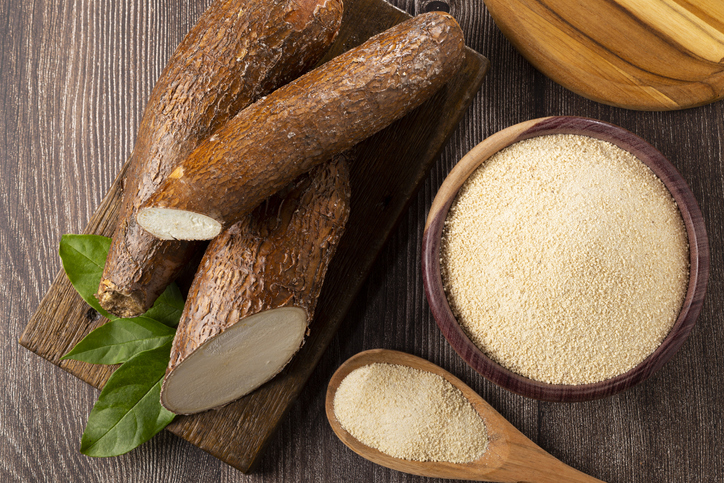I Went On Vacation, And Cassava Flour Started Calling My Name

Just like alternative milks, such as almond, rice, hemp, oat and soy milks, there are also many flour options besides white flour:
- Almond flour
- Coconut flour
- Quinoa flour
- Chickpea flour
- Brown rice flour
- Oat flour
- Spelt flour
- Buckwheat flour
- Rye flour
- Amaranth flour
- Teff flour
- Millet flour
I would eventually like to try all of these flours. But there is one in particular that is not on the list above that I would like to discuss now – cassava flour.
During a recent vacation to Jamaica, I was served cassava dumplings with my entree one night at dinner. I then located an article about cassava flour and became very intrigued, because I never thought that cassava, a root vegetable, would transform into a flour.

Interestingly, cassava, also called yuca, “...is cultivated throughout the tropical world for its tuberous roots, from which cassava flour, breads, tapioca, a laundry starch, and an alcoholic beverage are derived. Cassava probably was first cultivated by the Maya in Yucatán,” according to Britannica.
So I guess cassava is quite versatile! Cassava flour can be a great option, because it is gluten-free and rich in nutrients. Cassava flour actually contains a significant amount of one of my favorite nutrients – vitamin C!
This vitamin is one of the most important nutrients needed for our survival. Vitamin C may help protect the immune system from deficiencies that may lead to cardiovascular illnesses and other diseases. It is also an antioxidant, which means it helps protect our bodies from free radicals and other harmful molecules. It is a major producer of collagen, which is the main ingredient behind the repair of bone and skin tissue, cartilage, ligaments, tendons and teeth.
Cassava flour also contains potassium, an essential mineral that works with sodium to balance the fluid and electrolytes in the body. Potassium helps to keep blood pressure under control and may help reduce kidney stones and bone loss as you age. It may even reduce your risk of stroke. To give you a bit more perspective on how critical this mineral is to our overall health and functioning, our muscles need potassium to contract, and our heart muscles require potassium in order to beat properly and regulate blood pressure. Most adults need about 4,700 mg of potassium per day.
Cassava flour is high in carbohydrates. In general, however, carbs are essential to a healthy, well-rounded diet. Carbohydrate is one of the six basic nutrients you need to live. The others are protein, water, fats, vitamins and minerals. It’s very important to keep in mind what types of carbs you are consuming.
“The amount of carbohydrate in the diet – high or low – is less important than the type of carbohydrate in the diet,” reports Harvard T.H. Chan School of Public Health.
Cassava is a complex carbohydrate, which means it is digested more slowly (which can help you feel full for a longer period of time and, as a result, aid in weight loss). It delivers a gradual release of glucose into the bloodstream. Simple carbs, such as white sugar and white bread, give us that quick spike and do not make us feel satiated. Simple carbs are especially not recommended for people with type 2 diabetes or for those who are prediabetic.
Complex carbs are also critical for energy and fueling workouts. You can read more about complex carbohydrates here.
In addition to being a complex carb, cassava is also a resistant starch (a resistant starch is a type of complex carb).
“Resistant starch is a carbohydrate that resists digestion in the small intestine and ferments in the large intestine. As the fibers ferment they act as a prebiotic and feed the good bacteria in the gut,” according to the John Hopkins Patient Guide to Diabetes.
“Because resistant starch is not digested in the small intestine, it doesn’t raise glucose. Gut health is improved as fermentation in the large intestine makes more good bacteria and less bad bacteria in the gut. Healthy gut bacteria can improve glycemic control. Other benefits of resistant starch include increased feeling of fullness, treatment and prevention of constipation, decrease in cholesterol, and lower risk of colon cancer. Resistant starch is fermented slowly so it causes less gas than other fibers.”
Sounds like a win on top of more wins to me!
Cassava flour is not exactly a pantry item everyone has on hand, but you can usually find some at your local Whole Foods or order from Amazon. To make sure you are getting the best quality, make sure the packaging says unfermented. I also recommend going for organic.
If you are ready to give cassava flour a go, check out 17 Best Cassava Flour Recipes. I’m excited to try making the cassava flour tortillas for a healthy, veggie taco night.
It’s always so exciting to try new ingredients and healthy recipes. We really do have the power to take control of our health in so many ways, and I believe the number one place to start is in the kitchen.
As always, consult with your doctor before incorporating new foods into your diet (especially if you are pregnant, breastfeeding or have existing health issues).
Have you tried cassava flour or any other alternative flours? Please let us know how you liked it.
Enjoy your healthy life!
Disclaimer: This article is not intended to provide medical advice. Please consult with your doctor or another competent healthcare practitioner to get specific medical advice for your situation.
The pH professional health care team includes recognized experts from a variety of health care and related disciplines, including physicians, attorneys, nutritionists, nurses and certified fitness instructors. This team also includes the members of the pH Medical Advisory Board, which constantly monitors all pH programs, products and services. To learn more about the pH Medical Advisory Board, click here.







